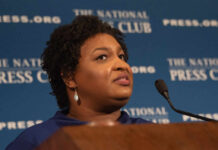
House Speaker Mike Johnson (R-LA) is under fire from fellow Republicans over what is being perceived as a flurry of serious betrayals to the GOP’s voters as he becomes the most important force pushing billions of dollars more in foreign aid past the finish line to be transferred to from the American people to foreign nations — in most cases, to secure their borders — without securing any meaningful action on our own catastrophic border crisis.
Johnson’s push for a $95.3 billion foreign aid package without any provisions for tighter border security has infuriated many conservatives across the country, as he not so long ago made repeated promises to voters that he would do the exact opposite.
Rep. Thomas Massie (R-KY) is openly supporting a motion to remove Johnson as speaker after the sizeable spending bill was allowed to make it to the floor and pass by a “conservative” speaker.
Speaker Johnson is plowing forward with $100 billion in security assistance for other countries while breaking his promise to Americans that our border would come first. https://t.co/PAhkEV4W2y
— Thomas Massie (@RepThomasMassie) April 18, 2024
The backlash against Johnson extends beyond Congress. Prominent conservative voice Donald Trump Jr. took to social media to slam Johnson’s leadership. “If you ever start to believe anything Republican leaders tell you just watch this,” Trump Jr. posted on X, formerly Twitter, emphasizing Johnson’s shifting stances since becoming speaker.
Enough already! If you ever even begin to start believing anything anyone in Republican leadership tells you just watch this. Pay close attention to those that don’t seem bothered by this. They’re not our friends. pic.twitter.com/rj2NMGBarg
— Donald Trump Jr. (@DonaldJTrumpJr) April 18, 2024
Many conservatives feel let down by Johnson’s apparent willingness to compromise with Democrats on issues like Ukraine aid without making any headway on domestic priorities like border security and fear his actions risk alienating a large portion of Republican voters.
Johnson has defended his approach arguing it represents a balanced way to govern, calling the effort to oust him “absurd.”
But the speaker’s words have done little to stem the backlash within the party. From online personalities to conservatives you meet on the street, there are very few who approve of the massive funding bill to defend the borders of other countries while our own border crisis rages on, endangering Americans in a host of ways and showing a prioritization process that places American citizens in second place — at best.




























